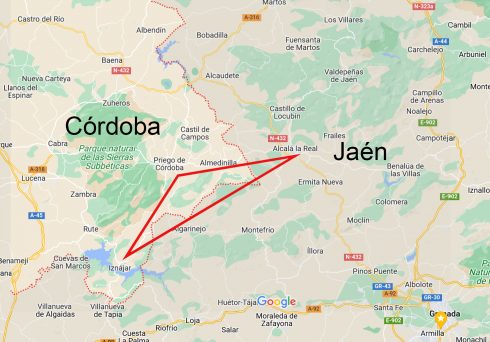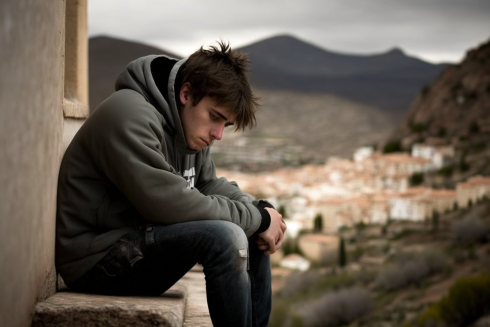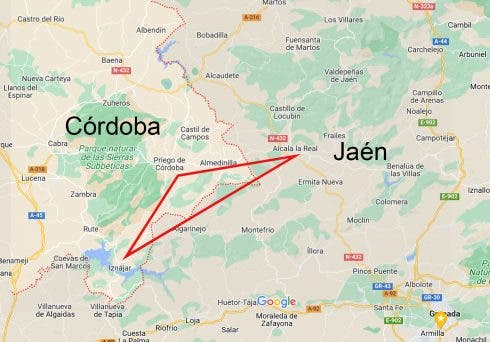THE attractive mountain town of Alcalá la Real is topped by a Crusader castle and cascades down a steep hillside, connecting the Guadalquivir Valley with the Granada plains.
Known for its world music festival, Etnosur, the Jaen province market town has a healthy expat population and a rich historical past that stretches back to Roman times.
But sadly, today, it also has a darker claim to fame: it is the suicide capital of Spain, and part of the notorious ‘suicide triangle’, formed with Priego de Cordoba and Iznajar, both in neighbouring Cordoba.

With just over 20,000 residents, Alcalá has an alarmingly-high suicide rate of 21 per 100,000 inhabitants, compared to the national average of 8.45 and the world average of nine.
Only Lugo and Zamora in Spain’s depopulated north (and barren Alentejo, across the border in Portugal) come close.
Spain, in general, is considered a high-risk country for suicides, with 11 people a day taking their lives, while over 50% of provinces have above average suicide rates.
In Alcala, this is felt acutely: the town has dealt with 300 suicides in the last three decades – the last one being an 18-year-old boy, who was found dead on Christmas Eve.
Statistics show that 75% of actual suicides involve men and 25% women. However, with attempted suicides, 60-70% involve women and the main age brackets are 15 to 34-year-olds and those over 65.

Diverse causes
So, what is causing such a suicidal tendency in Alcalá, a town that – on the surface – seems to have a lot in its favour?
Research suggests that living in remote, mountain areas can fuel suicide rates – partly because of the topography. Historically, many people could have felt isolated and trapped in Alcalá, and have had difficulty socialising. This is a common factor in Jaen, Granada and Cordoba, as well as parts of inland Malaga, and particularly isolated inland regions of Valencia and Castellon.
There also appears to be a domino effect, with people influenced by their peer group. And as suicide is a stigmatised topic, people don’t always seek help.
A pharmacist, who has studied the issue, told the Olive Press: “ Historically, this has been a traditional area planted with olive groves. The scenery is not very diverse, people frequently marry within their own families, many hardly ever leave the area, and it has very hot summers. The suicide tendency could also be passed down genetically.”
Weather is certainly found to influence suicides, with the colder, darker weather having a bad influence.
A 2021 study in Cordoba showed that women’s suicides coincide more with higher wind speeds (a problem that has afflicted Tarifa, one of the windiest places in Europe) and occur more frequently in Spring (46%), while men’s attempts are higher in autumn (29%) as it gets colder, with earlier nights.
Recent problems, including the long six-year recession and the pressures of the Covid pandemic, which strained people’s finances and mental health, have affected Andalucia’s suicide triangle.
Another key factor is the loneliness felt by single or widowed people, professional stress in a year when more Spanish companies folded than ever before (2022), causing unemployment. Youth depression is also a significant problem in Spain.
A recent 2022 survey in Catalunya on the emotional state of adolescents – with 270,000 students aged 12-18 – found that 43.4% had experienced suicidal thoughts, while over 40% had “hoped not to wake up in the morning”, and 26.8% had self-harmed.
The data is higher than in previous studies, which is alarming.
So what is being done?
Aware that the town must tackle its suicide problem head-on, Alcalá has now joined the European Alliance Against Depression (EAAD).
Funded by the European Commission and launched in Germany in 2004, it links family doctors, mental health specialists, pharmacists, social workers, police, and community volunteers, so they can identify potential suicide tendencies.
Andalucia’s Minister of Health, Catalina García, signed up Alcalá in October 2022, insisting that ‘mental health awareness should be a government objective’, including care for vulnerable adolescents.

To aid this new approach, Alcalá’s mayor, Antonio Marino, and social services boss, Mercedes Linares, have teamed up with Benedicto Crespo, an eminent professor of psychiatry at the University of Sevilla.
The director of the Virgen del Rocio Hospital explained that if specialists could “detect depression in time, they would be able to prevent suicide”.
A summer course on mental health in childhood and adolescence is now being developed and a local poster campaign is launching. Nearby, in Priego, a ‘Suicide Prevention Committee’ has been established.
“We are thankful for this project as we know it’s a taboo subject that we must overcome and face with determination,” explained the mayor of Alcalá last year.”
“The whole of society must get involved and be guardian angels of those you see with a lost look or lowered head. We will only get out of the stigma by taking care of each other…. And breaking the pattern.”
There are strong words, but will it work?
Although the will to stop suicide exists, there are still plenty of problems. Statistics show that only 20% of suicidal people approach primary care services in the days before their attempt, using such services such as Spain’s 061 number.
This is where intervention and professional emotional support can save lives, by pointing out alternative courses of action.
But many people don’t reach out and resources aren’t always sufficiently provisioned.
The facts are that Andalucia’s mental health services are overstretched – with long waiting lists – and the pandemic made this worse. Treating depression can be handled slowly and badly.
The Olive Press spoke to a grandmother whose adult daughter had a ‘suicidal episode’, as she calls it.
“The help is practically non-existent,” explained the British expat, based in Granada. “My daughter put her head through a rope and stood on a chair. This tipped over and she blanked out and broke her jaw, bit her tongue, and was covered in blood.”
She continued: “We managed to get there just in time and rushed her to ‘Urgencias’, where she was referred to the public psychiatrist, who was a waste of time. They either have pills and sedation, or you must volunteer to be a mental inpatient.”
“After several weeks, an ambulance finally took my daughter to a mental health ward, which was tiny and non-segregated. While there, she formed a relationship with a male inmate, who later turned up uninvited at my home. People are assessed, prescribed, and released with no proper backup. No-one is then keeping an eye out for them.”
There’s also a tendency for busy doctors to simply prescribe antidepressants instead of therapy.
Perhaps what is needed is a national approach, with more mental health provision and intervention, like the one that Alcalá is pioneering.
Spain is currently working on its proposed Mental Health Law, that aims to increase the current six psychologists and eight psychiatrists per 100,000 inhabitants to 18 of each as well as 23 specialist nurses. This is grinding through the legislative process. It could be a success story, well worth trumpeting around Spain. We will wait and see.
Do you need help?
Call for Help: 024 is Spain’s national suicide prevention service, operates 24/7 and is free of charge (English spoken).
Samaritans in Spain: Call FREEPHONE 900 525 100 between 10am and 10pm to talk to a trained listener in total confidence or: email: pat@samaritansinspain.com

